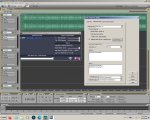I've done all that. When I select ASIO4ALL as the input (from Audition) it displays: Not Connected. The only way I get audio input is by selecting Audition for Windows. Any ideas?
Computer performance issues aren't going to manifest as an unexpected delay - They're going to manifest as struggling to keep up...Crackling, clicking, popping, and maybe failure with an error message.
I think you need to get your hands on a buffer size setting, somewhere, and test to determine if your current soundcard (and drivers) are capable of low enough latency monitoring.
If they're not then a device from a reputable manufacturer, with decent drivers, would probably be the solution.
Doesn't have to be fancy - USB interface from Presonus/Tascam/NI/whatever.
It's a while since I've used windows and I don't know Audition/Audacity that well, but I do know Reaper.
Download ASIO4All and install.
Download Reaper and install.
In Reaper
Options>Preferences>Devices select
AudioSystem : Asio, then
Asio Driver : ASIO4ALL v2.
Click 'ASIO configuration, make sure your soundcard is highlighted in the left panel then click the + to expand its IO and make sure the correct IO are highlighted.
Quite often there are multiple options like digital in/out, cd in, mic in, etc. Make sure you've ticked only the jack that you're using - Probably Line Input.
Below that you'll see 'Asio Buffer Size". This controls your latency.
Set it to 256 then OK the open dialog boxes.
In Reaper create and arm a new track and test. You should get audio and it should be lower latency.
If it's not low enough go back and lower that Asio Buffer Size to 128 and test again.
If latency is good but you're hearing artefacts - clicks/pops/etc - then you're looking at computer performance but let's cross that bridge if and when.
Hope that helps.




